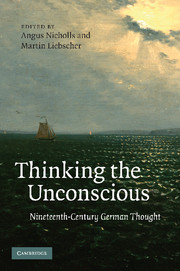Book contents
- Frontmatter
- Contents
- Notes on contributors
- Introduction: thinking the unconscious
- 1 The unconscious from the Storm and Stress to Weimar classicism: the dialectic of time and pleasure
- 2 The philosophical significance of Schelling's conception of the unconscious
- 3 The scientific unconscious: Goethe's post-Kantian epistemology
- 4 The hidden agent of the self: towards an aesthetic theory of the non-conscious in German romanticism
- 5 The real essence of human beings: Schopenhauer and the unconscious will
- 6 Carl Gustav Carus and the science of the unconscious
- 7 Eduard von Hartmann's Philosophy of the Unconscious
- 8 Gustav Theodor Fechner and the unconscious
- 9 Friedrich Nietzsche's perspectives on the unconscious
- 10 Freud and nineteenth-century philosophical sources on the unconscious
- Epilogue: the “optional” unconscious
- Works cited
- Index
2 - The philosophical significance of Schelling's conception of the unconscious
Published online by Cambridge University Press: 04 August 2010
- Frontmatter
- Contents
- Notes on contributors
- Introduction: thinking the unconscious
- 1 The unconscious from the Storm and Stress to Weimar classicism: the dialectic of time and pleasure
- 2 The philosophical significance of Schelling's conception of the unconscious
- 3 The scientific unconscious: Goethe's post-Kantian epistemology
- 4 The hidden agent of the self: towards an aesthetic theory of the non-conscious in German romanticism
- 5 The real essence of human beings: Schopenhauer and the unconscious will
- 6 Carl Gustav Carus and the science of the unconscious
- 7 Eduard von Hartmann's Philosophy of the Unconscious
- 8 Gustav Theodor Fechner and the unconscious
- 9 Friedrich Nietzsche's perspectives on the unconscious
- 10 Freud and nineteenth-century philosophical sources on the unconscious
- Epilogue: the “optional” unconscious
- Works cited
- Index
Summary
Locating the unconscious
Philosophical investigations which trace the genesis of a concept from what preceded it, and then trace how the concept influenced what succeeded it, encounter a problem in relation to “the unconscious.” This problem might admittedly seem to arise in relation to any concept, because disagreements about the content of a concept inevitably result from the never finally delimitable contexts in which it is encountered. Philosophers don't even agree, for example, on whether “Water is H2O” is “necessarily true in all possible worlds.” In such a case we can at least refer to the familiar fluid that we are disagreeing about and describe some of its properties. With respect to the unconscious the problem is more fundamental because we don't know what we are talking about: if we did, it would not be unconscious. As we shall see, much will depend here on the sense of “know.” Before getting to Friedrich Wilhelm Joseph Schelling (1770–1854), who has some claim to being the first person to use the term “unconscious” in the kind of ways which have been important in modern thought, we therefore need to explore some of the issues that make the unconscious a peculiarly recalcitrant topic. This should also enable us both to avoid the problem of just parroting what Schelling says when he employs the word “unconscious” and related terms, and to gauge whether his ideas are still philosophically significant.
- Type
- Chapter
- Information
- Thinking the UnconsciousNineteenth-Century German Thought, pp. 57 - 86Publisher: Cambridge University PressPrint publication year: 2010
- 3
- Cited by



